What Are Iranians Saying After US Strikes Leave Them Paralyzed and Shocked?

A Glimpse into the Hearts of Iranians Amid Turmoil
The ongoing conflict involving Iran has ignited a whirlwind of emotions among its citizens. With the recent U.S. strikes targeting key nuclear sites, numerous Iranians have reached out, voicing their fears, anger, and reflections on what these events mean for their nation and its future. This article delves into the personal experiences of individuals like Shahla, Mehri, Homayoun, and others, as they navigate the complexities of war, identity, and hope for change.
The Weight of Uncertainty
For many Iranians, the current geopolitical climate has created a sense of paralysis. Shahla, whose name has been changed for her protection, poignantly reflects this feeling: "My days and nights are the same. I feel paralyzed. I just stare at the ceiling all day and all night." This sentiment resonates deeply with countless others who find themselves caught in the crossfire of international politics, fearing for their safety and the future of their country.
As tensions mount, the unpredictability of what comes next leaves many in a constant state of anxiety. The recent bombing of the Isfahan, Natanz, and Fordo facilities has compounded these fears, as U.S. President Donald Trump declared the sites "obliterated." In stark contrast, Iranian Foreign Minister Abbas Araghchi warned that the U.S. had crossed "a big red line," hinting at the potential for devastating consequences.
Consequences of Conflict
The impact of these military actions is staggering. Reports indicate that at least 430 people have lost their lives due to the recent conflict, with some human rights groups estimating the fatalities to be even higher. The emotional toll on families and communities is profound, as they grapple with the loss of loved ones and the uncertainty of the future.
Expressions of Anger and Sorrow
Mehri, another voice among the affected, articulates a mix of sorrow and clarity in her response to the strikes. "I'm extremely angry and upset about what's happened. I don't think I've ever felt this level of sorrow and rage over anything in my life," she confesses. This anger is directed not only at the immediate violence but also at the leaders who orchestrate these conflicts, whom she identifies as representatives of their respective nations’ ideologies.
This sentiment underscores a broader realization among many Iranians: the conflict is not merely about territorial disputes or nuclear programs; it is deeply personal. Mehri notes, "This war - Iran's war - is essentially a conflict between three individuals. Three leaders, from three countries, driven by their own ideologies." Such statements reflect a growing awareness of the disconnect between political leaders and the lives of ordinary citizens.
The Connection to the Homeland
Homayoun, a resident of Maku, embodies the spirit of resilience that many Iranians share. In defiance of Trump's threats, he asserts, "Yes, we're going through tough times - but we'll stand by our country to the very end. And if needed, we'll give our lives for our homeland, for our honour." This fierce loyalty to their nation illustrates the depth of commitment many feel, even amid overwhelming adversity.
The Call for Peace
Despite the prevailing chaos, there are voices of reason among the populace. One Iranian man expressed hope that the current escalation represents a peak, suggesting that a shift towards de-escalation might be on the horizon. His optimism is rooted in a pragmatic understanding of the situation: "Iran is rational enough to know that any response targeting the U.S. would be complete suicide."
This desire for peace is further emphasized by another individual who anticipates the birth of his child in the coming days. He wishes for this new life to coincide with a transformative phase for Iran: "I hope their birth coincides with the birth of a new Iran - one that adopts a fresh approach toward both the international system and its domestic affairs." This longing for a brighter future encapsulates the hope that underlies much of the despair.
Longing for Change
Many Iranians are not just yearning for peace but also for a fundamental shift in their nation's governance. The strict laws governing personal freedoms, such as the enforcement of hijab, have led to widespread protests and a crackdown on dissent. As one man poignantly notes, "My child will be born in a few days, and I hope they grow up knowing that surveillance cameras and security forces should be focused on real threats, not on enforcing the hijab."
This longing for change reflects a broader dissatisfaction with the status quo and a desire for a future where personal freedoms are respected and valued. The voices of Iranians echo a collective yearning for not just stability, but also for a society where individuals can thrive without fear of repression.
Conclusion: A Future Shaped by Hope
The personal narratives shared by individuals in Iran reveal the profound emotional and psychological impact of ongoing conflict. Their stories illustrate the complex interplay between national identity, personal experiences, and the overarching political landscape. As they grapple with anger, sorrow, and hope, it is evident that Iranians are not merely passive observers in this crisis; they are active participants with dreams for a better future.
As the situation continues to unfold, one can only wonder: what will the future hold for Iran and its resilient people? Will they find a path to peace, or will the cycles of violence persist? The journey ahead is uncertain, but the voices of Iranians serve as a powerful reminder of the human spirit's capacity for resilience and hope.
FAQs
What are the key issues causing unrest in Iran?
The key issues causing unrest in Iran include geopolitical tensions, strict domestic laws, and widespread dissatisfaction with the government. Many Iranians are calling for greater personal freedoms and a reevaluation of the country's foreign policy.
How has the recent conflict affected ordinary Iranians?
The recent conflict has led to significant loss of life, heightened anxiety, and a sense of paralysis among ordinary Iranians. Many are expressing deep sorrow and anger at the ongoing violence and its implications for their future.
What do Iranians hope for in the future?
Many Iranians hope for a future characterized by peace, stability, and greater personal freedoms. There is a longing for a government that prioritizes the well-being of its citizens over ideological conflicts.
As the situation in Iran evolves, the stories and aspirations of its people remain a testament to their resilience. Will this conflict lead to meaningful change, or will the cycle of violence continue? #Iran #Peace #Change
Published: 2025-06-22 14:44:03 | Category: technology



